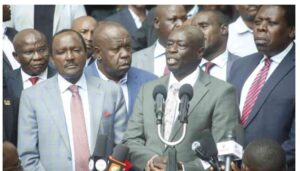Hustlers’ nightmare as the government goes after tailors, small business traders in new levies

Government through KEBS goes after tailors, small business traders as it seeks to enforce a decades-old levy
Government through KEBS goes after tailors, small business traders as it seeks to enforce a decades-old levy.
The Kenya Bureau of Standards (Kebs) has roiled a number of small enterprises by attempting to impose a tax that has been in place for decades.
Each manufacturer is required to pay the Bureau of Standards a monthly levy recoverable at source at the rate of 0.2% of the ex-factory price of goods created in a month, excluding value-added tax and discounts, under the terms of the Standards Levy (Amendment) Order 1999.
Each product made during a given month is subject to a standards levy of up to Sh400,000 annually and a minimum of Sh1,000 monthly, which must be paid through the Kenya Revenue Authority’s (KRA) iTax system standards levy account by the twentieth day of the following month.
“A manufacturer is defined to include a person or persons who produce, process, treat, install, test or operate and use. Persons who manufacture or intend to manufacture are required to notify the Managing Director Kebs” Kebs said in a notice.
The Kebs list of manufacturers includes tailoring, printing, publishing, screen printing, photocopying, and photographic studios.
It also includes dry-cleaning, weaving, embroidery, and knitting among others.
Kenya inks deal with Saudi Arabia to import fuel on credit
Public servants set to lose allowances if plans by SRC go through
US launches another Ksh12.9 billion project just after Ksh16 billion donation
World Bank pushes for higher water and sewer bills in Kenya
The tax reminder by Kebs comes amid revenue pressure on the State against the backdrop of economic shocks due to the Covid-19 pandemic and the Russia-Ukraine war.
The government is presently highly pressured to enhance tax compliance and step-up revenue collection to finance public goods and services.
To increase compliance and collections, KRA has turned to a variety of techniques, such as intelligence checks and automation of its revenue systems.
By June, the KRA hopes to have collected Sh297.2 billion in excise duty revenue, and it anticipates raising that amount to Sh521.5 billion by 2027.
Also read,
Ruto unveils KSh 3.6 trillion budget, seeks to borrow KSh 700 billion
UK University to build SIX campuses in Kenya in a Ksh 158B deal
Deported Rubis Kenya CEO returns after Ruto’s victory
EPRA announces new fuel prices
Follow us





